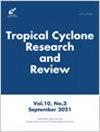人工智能在台风预报中的应用综述
IF 4.1
4区 地球科学
Q3 METEOROLOGY & ATMOSPHERIC SCIENCES
引用次数: 0
摘要
随着全球气候变暖的加剧,台风(热带气旋)发生的频率和强度变得越来越不确定,给人类社会带来了重大挑战。传统的台风预报方法虽然在过去几十年里取得了显著的进步,但在处理复杂的气象资料和提供准确的预报方面仍然面临许多限制。近年来,人工智能(AI)技术的快速发展为台风预报领域带来了新的机遇,通过提高台风轨迹和强度预测的准确性,正在给台风预报带来革命性的变化。本文回顾了人工智能模型,特别是卷积神经网络(cnn)和循环神经网络(rnn)在台风预报中的应用,并通过将人工智能模型与欧洲中期天气预报中心(ECMWF, TC)等传统数值模型进行比较,分析了人工智能模型在2024年的表现。台风“海鸥”的案例研究展示了人工智能的能力和局限性。该研究强调了人工智能的优势、挑战以及未来对加强台风预测系统的建议。本文章由计算机程序翻译,如有差异,请以英文原文为准。
Review of artificial intelligence application in typhoon forecasting
As global climate warming intensifies, the frequency and intensity of typhoon (tropical cyclone) have become increasingly uncertain, posing significant challenges to human society. Traditional typhoon forecasting methods, while having made remarkable progress over the past few decades, still face numerous limitations in handling complex meteorological data and providing accurate predictions. In recent years, the rapid development of artificial intelligence (AI) technologies has brought new opportunities to the field of typhoon forecasting and is revolutionizing typhoon forecasting by improving the accuracy of track and intensity predictions. This paper reviews the applications of AI models, particularly Convolutional Neural Networks (CNNs) and Recurrent Neural Networks (RNNs), in typhoon forecasting and analyzes the performance of AI models in 2024 by comparing them with traditional numerical models like the European Centre for Medium-Range Weather Forecasts (ECMWF, TC). A case study of Typhoon Gaemi demonstrates AI’s capabilities and limitations. The study highlights AI’s advantages, challenges, and future recommendations for enhancing typhoon prediction system.
求助全文
通过发布文献求助,成功后即可免费获取论文全文。
去求助
来源期刊

Tropical Cyclone Research and Review
METEOROLOGY & ATMOSPHERIC SCIENCES-
CiteScore
4.60
自引率
3.40%
发文量
184
审稿时长
30 weeks
期刊介绍:
Tropical Cyclone Research and Review is an international journal focusing on tropical cyclone monitoring, forecasting, and research as well as associated hydrological effects and disaster risk reduction. This journal is edited and published by the ESCAP/WMO Typhoon Committee (TC) and the Shanghai Typhoon Institute of the China Meteorology Administration (STI/CMA). Contributions from all tropical cyclone basins are welcome.
Scope of the journal includes:
• Reviews of tropical cyclones exhibiting unusual characteristics or behavior or resulting in disastrous impacts on Typhoon Committee Members and other regional WMO bodies
• Advances in applied and basic tropical cyclone research or technology to improve tropical cyclone forecasts and warnings
• Basic theoretical studies of tropical cyclones
• Event reports, compelling images, and topic review reports of tropical cyclones
• Impacts, risk assessments, and risk management techniques related to tropical cyclones
 求助内容:
求助内容: 应助结果提醒方式:
应助结果提醒方式:


